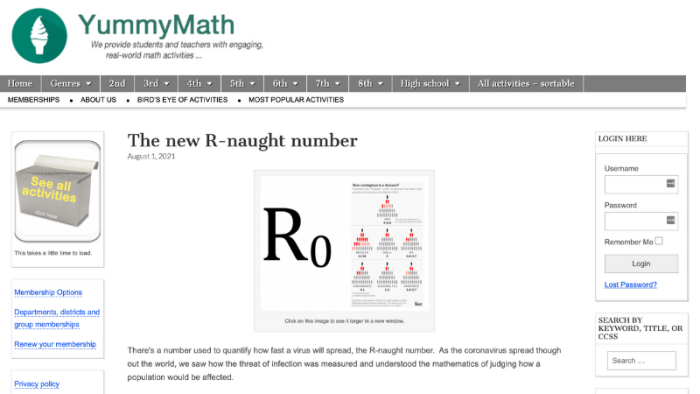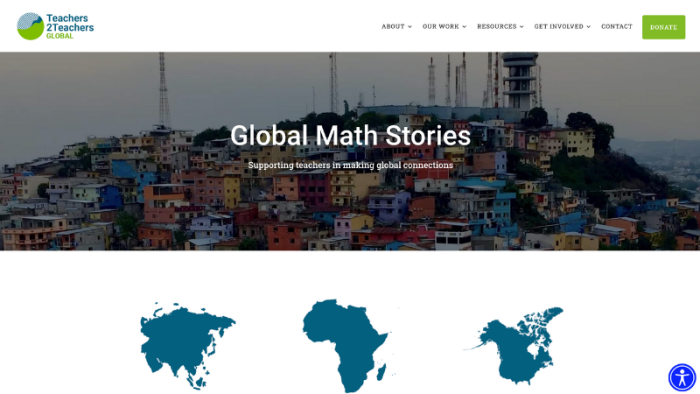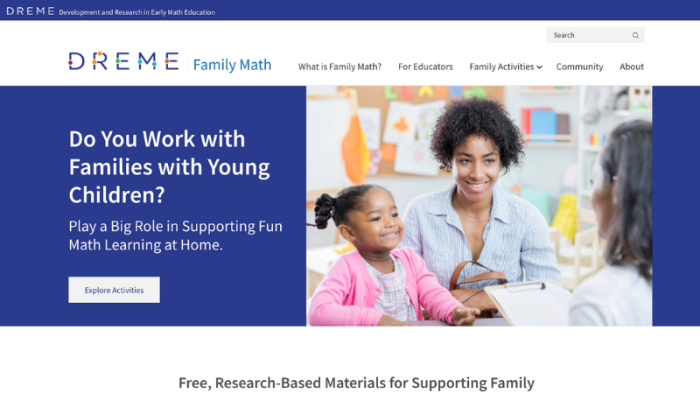Give students the practice they need with these worksheets that are a cut above the rest.

Math worksheets have been a staple at school since mimeograph machines started staining teachers' hands. And for good reason: They give students the extra practice it often takes for mathematical concepts to stick.
Since lots of schools have adopted digital curricula, teachers may not be printing things as often. But when you do need to fire up the printer, you want to make all that paper count with worksheets that offer fresh approaches to arithmetic practice and math concepts.
Most readily available worksheets look pretty familiar; they're problem sets or common math activities kids can do on their own, and sometimes that's all you need. Sites like Education.com, Mashupmath, and Learning Resources have plenty of free worksheets filled with solid, standard fare. But it's the standout sites below that break that mold. The sites below offer quality over quantity and unique approaches to traditional math worksheets.
We've broken these down into three different types of worksheets that we hope you'll find useful. You can use the links below to jump to a section.
- Real-World Math Worksheets: Students apply math concepts to actual circumstances or ideas.
- Co-Curricular Math Worksheets: Students' math work branches out into other content areas.
- Hands-On and Cooperative Math Worksheets: Students work collaboratively, beyond the paper worksheet.
Real-World Math Worksheets
Since the dawn of time, kids have asked math teachers, "But am I ever going to use this in real life?" When kids see direct connections between what they're learning and their interests, they're naturally more invested in that learning.
But while there are plenty of "real-world" math worksheets out there, so many of them feel contrived (How many watermelons does Susie really need?). Even truly relevant applications -- like finances and measurement for home improvement -- don't work for everyone. In different ways, the selections below offer a more thoughtful spin on worksheets.
Yummy Math

Suggested grades: Elementary to high school.
Yummy Math offers free math worksheets, but you can also become a member for $25 and get the solutions, teacher tips, PowerPoint presentations, and Excel attachments. To find something for your classroom, you can search activities by grade level, genre, or by popularity. To see the math concepts that are covered, hover over the grade levels, then click on the standard you're looking for.
Using Yummy Math Worksheets
- If you search by genre, you can find resources in categories like Holidays and Annual Events and Math and Food.
- There are also some co-curricular topics here like Math and Social Studies and Math and Art, which makes Yummy Math both relevant and a cool marriage between subjects.
- Many of the worksheets aren't just relevant to many kids' interests and lives; there are also some that include current events.
- You can leverage some silliness or find connections to sports.
Citizen Math

Suggested grades: Middle school to high school
Like Yummy Math, Citizen Math covers lots of relevant topics for kids and teens. The Citizen Math lessons are more polished than Yummy Math; however, only six are free. The four paid packages won't break the bank, though.
To find what you need, you can sort by grade or math concept -- once you click you'll see the covered concepts, real-world takeaways, math standards, and even where the lesson might fit best into your curriculum. The Teach Mode is like a presenter mode, so you can show an introductory video and relevant charts or graphs. However, those are extra bells and whistles; most lessons also allow you to simply use the printed handouts.
Using Citizen Math Worksheets:
- If you're wondering just how relevant the topics are, consider this: One of the free lessons uses integers to explore the importance of having a range of emotions. If you use the Teach Mode the lesson introduction comes with a clip from the movie Inside Out. Weaving SEL into a math lesson isn't something you see every day, and it punctuates just how applicable math really is.
- Add to that lessons about homelessness, the opioid crisis, and texting while driving, and it's easy to see why Citizen Math is a great resource for making math relevant.
Other real-world math worksheets to check out:
If you work with younger kids it's a bit easier to find opportunities that apply math concepts to the world around them. That said, it's nice to have a few unique worksheets that go beyond the expected.
- Kindergarten: Use these Sesame Street handouts and activities to introduce the concepts of saving, spending, and sharing.
- Grades 2-3: To make financial literacy a bit more personal, you could use this FitMoney handout to explore those concepts for slightly older students and then progress into applying addition and subtraction.
- Grades 3-5: For Snoopy fans, there's a series of activities from Young Minds Inspired that apply early math concepts to sports. Or, you could use an activity from the U.S. Census to compare amusement parks state by state.
- Grades 9-10: Since online investing has been all the rage with some teens, check out some of these stock market worksheets from Teachnology.
Co-Curricular Math Worksheets
Sometimes you'll hear kids -- or even adults -- claim, "I'm not a math person." While they might feel they're more skilled in another subject, it can also mean, "My math spirit was crushed along the way, and I just needed someone to come at it from another angle." That's where a co-curricular approach to math can be useful. Incorporating math concepts into other subjects can give kids new perspectives and entry points. With the worksheets below, students who've decided they're “not a math person” might just find themselves able to understand concepts through the lens of another skill or subject.
Mathkind Global Math Stories

Suggested grades: Middle school to high school
These worksheets apply math to the real world with the goal of fostering a student-centered approach to teaching that encourages student confidence and leadership. Through conferences, teacher trips, master classes, and more, they work to help math teachers and students while including messages of social justice.
Using T2T Global Math Stories worksheets
- All of these free worksheets embody the principles of their mission, offering a really unique way to use math.
- The worksheets are actually articles that share information about geological or cultural features of different places around the world, so they can tap into social studies and ELA topics with lots of opportunities for personal connections and interests. There's no print button, but it's easy enough to take the articles offline.
- Stories represent many continents and countries. For example, you can find facts about a national park in Ghana, weaving in Indonesia, goats in Morocco, and much more.
- Articles are divided into topical sections; in the sidebar, you may find a slideshow, an extension question, a social justice question, links to explore further, and an invitation to share your own story.
- Most relevant, however, are the math resources. These include math questions that relate specifically to the article and sometimes even other lessons and resources to use.
- What's missing, unfortunately, is a way to filter the activities by math concept, grade level, or reading level. So, you may have to do some exploring to find worksheets that'll work best for your class.
Other co-curricular worksheets to check out:
- Grades 2-12: Though Yummy Math and Citizen Math are covered in the Real-World Math Worksheets section above, they also have some great crossover between subjects.
- Grades 3-5: Artful Maths offers some simpler activities like creating a Celtic Knot or an impossible object.
- Grades 6-8: For other options, especially ones that incorporate a bit of art, try these worksheets about Egyptian art or armor from Japan and Germany, courtesy of the Walters Art Museum. Their Common Core Connection series has quite a few worksheets to choose from.
Hands-On and Cooperative Math Worksheets
Kids who learn best by doing -- or by working with others -- might get more out of activities that involve applying math to something beyond the worksheet itself. Because there's always so much to cover, it can feel hard to take the time to dive into these types of projects. That said, for students who might not do as well with more traditional methods, these math-related activities can be a rich and engaging way to learn. And for the littlest learners, encountering concepts through activities and play is always ideal.
DREME Family Math

Suggested grades: PreK-1st grade
DREME -- Development and Research in Early Math Education -- is a project developed by researchers from around the country and based out of Stanford University that offers resources to help weave math into kids' lives at home. For educators, they offer tips and information about teaching early math concepts, along with suggested activities to share with families. Some of those tips are all about making math a part of everyday conversations, some are suggestions for games, and some are even recipes!
Using DREME Worksheets:
- For the most part, DREME worksheets aren't the kind that kids complete in class. Instead, they're primarily resources to send home -- many in English and Spanish -- to help kids apply math in daily life.
- The games and cooking activities could also be useful in the classroom. Though it may not be feasible for teachers to actually cook something in class, making a smoothie or personal fruit pizza is more possible.
- You can also take inspiration from DREME's Math Snacks to integrate math conversations throughout the school day.
Other hands-on and cooperative worksheets to check out:
- Grades 1-2: If you want to get kids moving around and talking to each other, a worksheet that gets them to collect data works well (from Engage NY). With simple questions like, "What snack do you like best?" this worksheet provides an easy entry point for 1st and 2nd graders that adds some cooperation.
- Grade 3: Scholastic offers a set of LEGO Batman activities. So, if you don't mind a bit of product placement, these worksheets can help get kids working -- and thinking together.
- Grade 6-8: If you work with slightly older kids who are ready for a bit more challenge, check out these math lab worksheets from Teachnology. For instance, the Light My Stadium lab gets kids working together on a fictional, but realistic, math problem.
Even more math worksheet approaches to consider:
Although these worksheets don't fall neatly into any of the above categories, they have some interesting approaches that are worth checking out.
- Grade 1: For instance, this worksheet from Engage NY asks students to look at how other kids solved the problems, which comes at the concept from a slightly different angle.
- Grades 4-5: And when it comes to algebraic reasoning, ramping up to variables with friendly symbols can make the math less intimidating (from Mash Up Math).
Image courtesy of Allison Shelley/The Verbatim Agency for American Education: Images of Teachers and Students in Action.









